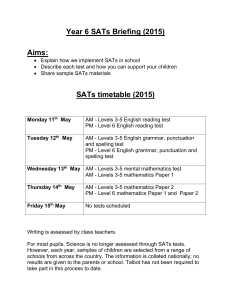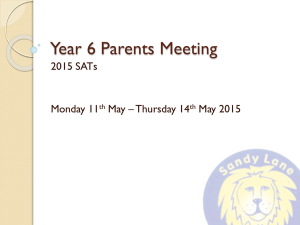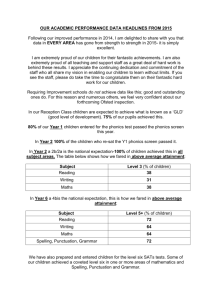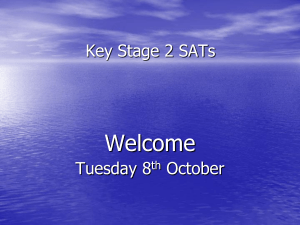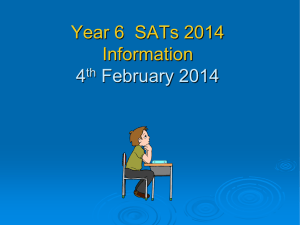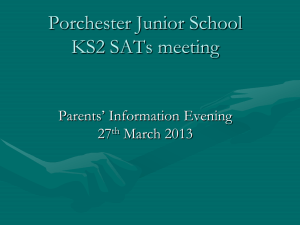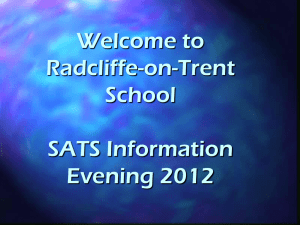KS2 SATs brief 2015 - full
advertisement
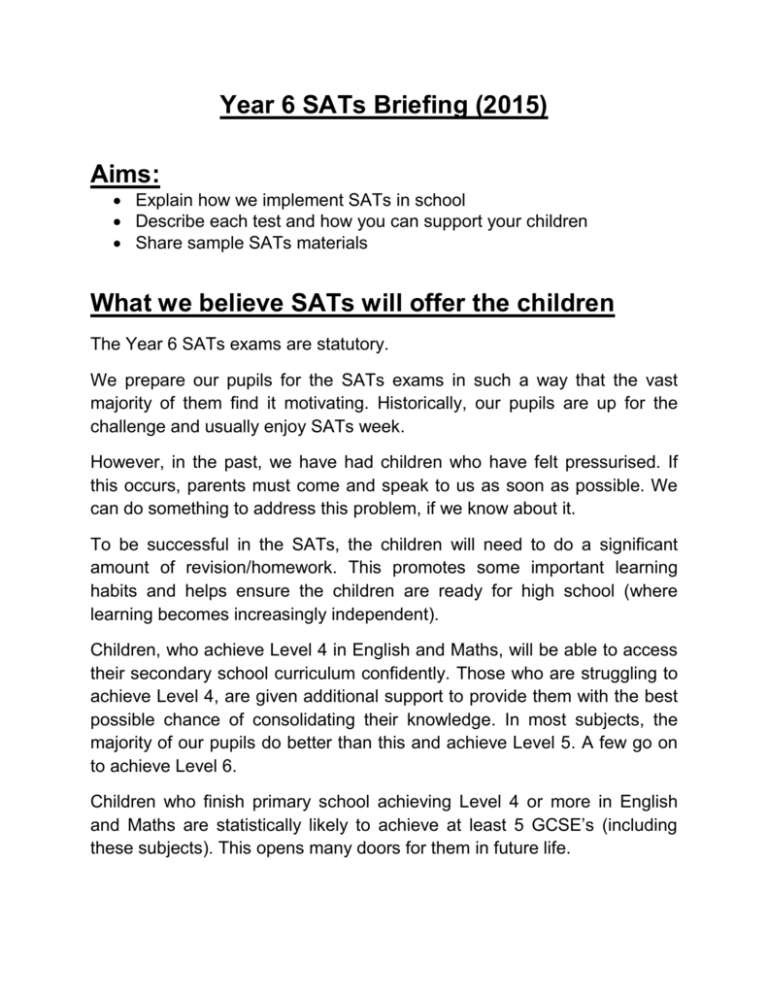
Year 6 SATs Briefing (2015) Aims: Explain how we implement SATs in school Describe each test and how you can support your children Share sample SATs materials What we believe SATs will offer the children The Year 6 SATs exams are statutory. We prepare our pupils for the SATs exams in such a way that the vast majority of them find it motivating. Historically, our pupils are up for the challenge and usually enjoy SATs week. However, in the past, we have had children who have felt pressurised. If this occurs, parents must come and speak to us as soon as possible. We can do something to address this problem, if we know about it. To be successful in the SATs, the children will need to do a significant amount of revision/homework. This promotes some important learning habits and helps ensure the children are ready for high school (where learning becomes increasingly independent). Children, who achieve Level 4 in English and Maths, will be able to access their secondary school curriculum confidently. Those who are struggling to achieve Level 4, are given additional support to provide them with the best possible chance of consolidating their knowledge. In most subjects, the majority of our pupils do better than this and achieve Level 5. A few go on to achieve Level 6. Children who finish primary school achieving Level 4 or more in English and Maths are statistically likely to achieve at least 5 GCSE’s (including these subjects). This opens many doors for them in future life. Following the tests, the children are thrown into a wider and richer curriculum, which offsets the additional focus on literacy and maths between February and May. Lastly, the results are analysed carefully, so we can identify areas of strength and areas for improvement within school. This has real benefits for pupils lower down the school. SATs timetable (2015) Monday 11th May AM - Levels 3-5 English reading test PM - Level 6 English reading test Tuesday 12th May AM - Levels 3-5 English grammar, punctuation and spelling test PM - Level 6 English grammar, punctuation and spelling test Wednesday 13th May AM - Levels 3-5 mental mathematics test AM - Levels 3-5 mathematics Paper 1 Thursday 14th May AM - Levels 3-5 mathematics Paper 2 PM - Level 6 mathematics Paper 1 and Paper 2 Friday 15th May No tests scheduled Writing is assessed by class teachers. For most pupils, Science is no longer assessed through SATs tests. However, each year, samples of children are selected from a range of schools from across the country. The information is collated nationally; no results are given to the parents or school. Talbot has not been required to take part in this process to date. Guidance on writing levels (3-5) Writing assessments (levels 3-5) Writing is assessed by the Year 6 teachers and the final level is based on a broad range of tasks taken throughout the year. Sometimes, external moderators will visit schools to validate judgements. Talbot was moderated two years ago and our judgements were found to be correct. All the examples are partial extracts. How can you support your child in writing? Encourage writing at home, especially writing for a purpose. Discuss ideas for homework with your child, before they settle down to write it independently. Ask your child to read your homework to you. Can you improve it and make corrections?* Insist on good handwriting and presentation. *Not sure what to ask them? Visit the Parent/Carer Zone and go to the Literacy Zone. There are documents showing how you what your child needs to do to achieve Level 4 and Level 5 in writing, so you can help them. Level 3 Level 4 Level 5 English reading test (levels 3-5) The texts in the levels 3-5 English reading booklet will not be linked by a theme. The booklet will contain three or four texts. The least demanding text will come first with the following texts increasing in level of difficulty. The children will be given one hour to read the texts and complete the questions at their own pace. There are 50 marks available. How can you support your child in reading? Promote the experience of reading by valuing and modelling it. Encourage your child to read often and broadly. Listen to your child read and discuss it with them; this is more important than the mechanical skills. Ask them questions about their books.* Get your child to write down their answers, especially if they find this tricky. You can buy reading comprehension study books (from WH Smiths and the like) and look at the reading texts on Education City. You need to check that anything you buy is designed for KS2 and levels 3-5. *Not sure what to ask them? Visit the Parent/Carer Zone and go to the Literacy Zone. There are examples of questions for fiction texts, non-fiction texts and poetry to give you some ideas. Sample reading text (levels 3-5) Midas and the Golden Wish - Miriam Hodgson King Midas owned everything a man could wish for, but his most prized possession was his daughter, Philomena. She was his youngest child and the loveliest. Her eyes were darkest brown, her hair fell softly round her face like silk. Her skin was as soft as velvet. She sang like a nightingale and danced like a butterfly. But her most wonderful gift was her smile. When Philomena smiled everyone became happy. Her name meant, 'I am loved'. One day Philomena came running to Midas. 'Father, there is a strange man at our gates.' Midas took Philomena by the hand, and walked to the gate. There stood Silenus, the teacher of the god Dionysus. Midas welcomed him: `Silenus, I am honoured by your visit. Come in and rest from your journey.' Midas sent for servants to look after Silenus. He ordered the finest wines and food to be prepared for a banquet for his guest. Musicians and dancers entertained the visitor and the gentle splashing of fountains lulled him to sleep. Sample reading questions (levels 3-5) These questions are about Midas and the Golden Wish (pages 610). How did Philomena make everyone feel? [1 mark] sad happy confused honoured Look at the first paragraph (page 6). Explain how the author makes Philomena seem special. [2 marks] How do you know that Midas treats Silenus as an important visitor? Find two pieces of evidence. [1 mark each] Complete the thought bubble to show what Midas is thinking when he puts off telling Silenus his wish on page 7. [2 marks] Other questions are matching exercises, completing tables or longer comments on what the children think (linked to evidence from the text). The grammar, punctuation and spelling test (levels 3-5) The children are required to answer questions worth 50 marks in 45 minutes. Most of the questions are worth 1 mark but a few are worth 2 marks. Afterwards, the children do a spelling test which lasts 15 minutes. How can you support your child in grammar, punctuation and spelling? Encourage lots of reading! Why has the author chosen to use punctuation at certain points? Education City and DB Primary have many resources. Help your child to learn their spellings each week. Insist on good grammar in homework. Check it with them. Is it correct? Could it be more ambitious? Examples from the grammar test (levels 3-5): Level 3-5 Complete the sentence below using I or me. I wanted my mum to watch ______ in the school play. After we went cycling, Emma and ______ were very tired. The teacher asked Tim and _____ to collect the books. Level 3-5 max is coming here in December to learn English (a) Circle the three letters in the sentence above that should have a capital letter. (b) For one of the words you identified above, explain why it needs a capital letter. Word chosen: __________ ___________________________________________________________ Level 3-5 Write a connective from the boxes in each space to complete the as and however sentences. Use each word once. Sarah ____________ Ashley said the science test was easy. Paul, ____________, complained to the teacher _____________ it was too hard for him. Level 3-5 Copy the sentence below. Add any missing full stops or capital letter. it went into the water and made a terrible splash Sample words from the spelling test (levels 3-5): Children have to spell 20 individual words. They are given a sentence to help grasp the context. Examples might include: Laugh Attracted Different Temperature Immediately Mathematics tests (levels 3-5) There are two 45 minute, written maths papers (each worth 40 marks). Each written maths paper covers a variety of topics from the maths curriculum. The easier questions tend to come at the start and the harder questions tend to be towards the end of the paper. Completing the paper can be a difficulty for some pupils. Calculators are not allowed in the levels 3-5 mathematics tests. This is a change from previous years and the level thresholds may be adjusted as a result. There is also a mental and a mental maths paper (worth 20 marks). The final level is based on all three papers. How you can help your children prepare for the maths tests: Make sure that your child always does their maths homework. Support them with their times table knowledge (including applying it). Make sure your child can tell the time. Make sure your child is confident with practical measuring and different units of measurement. Encourage maths in real life, so it becomes less abstract. Education City (including timed tests) You can buy maths study books (from WH Smiths and the like). You need to check that anything you buy is designed for KS2 and levels 3-5. Mental maths test (levels 3-5): The children are asked to solve 20 questions. They get 5, 10 or 20 seconds to do each one. They are allowed to make notes or calculations in the margin and this can be very useful if they are quick enough. Example questions from the mental paper: Divide forty-two by seven (5 seconds) What is two-thirds of 150? (5 seconds) What is 25% of 600 (10 seconds) Two angles of a triangle are 50º each. What is the angle of the third angle? (10 seconds) What is 32 multiplied by 8? (15 seconds) What number is exactly half way between 10 and negative 20? (15 seconds) Example questions from the written paper: Level 3 Level 4 Level 5 Level 5 Applying for additional time Schools may apply for additional time online, by answering a short series of questions about the child. The questions will draw on teachers’ knowledge of children and their ability to assess an individual child’s access needs. It is no longer linked to particular screening tests. Additional time is designed to support children with specific needs, rather than to give an edge for middle ability children. In addition, the time provided must make a significant difference to a pupil’s performance. Last year, one pupil was eligible for additional time. Help with Readers: Pupils cannot be helped with reading in the reading test. Pupils can be supported with reading in the maths and SPAG tests. Support means assisting children who are having mechanical reading issues; they cannot have things explained to them. Typically, children are helped with individual words, phrases or questions, rather than the whole tests. Level 6 tests: Nationally, 0% of children achieved Level 6 in reading, 2% achieved Level 6 in writing, 3% achieved L6 in Grammar, Punctuation and Spelling and 6% achieved Level 6 in maths. This is equivalent to between 0 and 4 children in our current Y6. As the Level 6 tests are so challenging, only a small minority of pupils will be selected to sit them by their teachers. Children must complete the Level 6 tests on top of the normal Level 3-5 tests. Extract from a writing script (level 6) Example text for the reading test (level 6) Example questions from the reading test (level 6) Grammar, Punctuation and Spelling (level 6) The Level 6 grammar test is 20 marks in 20 minutes. Pupils then complete a 20 minute writing test where their composition, punctuation and spelling are assessed in context. This is requires the children to be both accurate and able to demonstrate the full extent of their grammatical ability. Level 6 Insert commas and a semi-colon in the sentence below. I love red blue yellow and green he prefers black white orange and purple. Level 6 Circle two verbs in each of the sentences below. They played with Gemma, the kitten, until she spied a butterfly on the rose bush. Bats see with difficulty, but use their individual radar systems effectively for navigation purposes. Level 6 Spellings: Children have to spell 20 individual words. They are given a sentence to help them with the context. Previous examples include: Permanent Leisure Biscuits Foreign Synchronised Maths tests (level 6) There are two Level 6 maths tests and each one is 25 marks in 30 minutes; they are done back to back. There is no mental maths test at Level 6. The first paper is a written paper and the second one allows the use of a calculator. We have found that reading skills, being able to show your mathematical thinking and speed are all major factors in these tests. Level 6 (no calculator) Level 6 (calculator)
